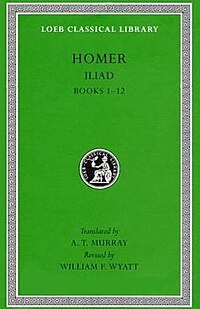 This definitive bilingual hardcover collection of classical Greek and Roman writers is an essential for the student of history, literature, politics, or philosophy. An example is Suetonius' Twelve Caesars upon which Robert Graves' historical fiction I, Claudius was largely based. Also available are such authors as Homer, Aristotle, Epictetus, Julius Caesar, Marcus Aurelius, Aristophanes, Lucretius, Augustine and Xenophon, and literally hundreds of other foundational classical works. They can be found in large Borders and Barnes & Noble book stores or be ordered on-line, new or used.
This definitive bilingual hardcover collection of classical Greek and Roman writers is an essential for the student of history, literature, politics, or philosophy. An example is Suetonius' Twelve Caesars upon which Robert Graves' historical fiction I, Claudius was largely based. Also available are such authors as Homer, Aristotle, Epictetus, Julius Caesar, Marcus Aurelius, Aristophanes, Lucretius, Augustine and Xenophon, and literally hundreds of other foundational classical works. They can be found in large Borders and Barnes & Noble book stores or be ordered on-line, new or used.The Essential Stoics and Epicureans
The following recommended Loeb Classical Library Editions are excellent reproductions of the original Greek or Latin manuscripts, in those languages, with original text on the left and the English translation on the right. The volumes average about $20 each. Links point to the appropriate volume at Amazon.
Diogenes Laertius' Lives of the Eminent Philosophers, Vols.I, & II
This Greek work, by the Epicurean historian, is the primary source for our knowledge of most philosophers up to the time of Epicurus, whose biography is the last and largest in the work. Other than fragments found elsewhere, Diogenes is the main source on Epicurus. The biographies often amount to mere sketches, but each philosopher's primary doctrines, original formulations, and remarkable sayings or accomplishments are given. Perhaps the most striking aspect of Diogenes' work is how it demonstrates that almost no modern issue in philosophy was not already known and debated over two millenia ago.
Lucretius De Rerum Natura "On the Nature of Things"
This work is considered one of the greatest literary accomplishments in Latin, as it is not only a treatise on natural history, but is set to classical Latin metrical form, a sort of scientific primer in verse. This work is the largest surviving Epicurean text. Lucretius' purpose was to provide a text which would help its readers understand nature enough not to suffer from suspicious fears. Given that experimental science was not a developed concept and that most of the work is based upon observation and speculation its sophistication is still striking. This text is not, however, essential in any ethical sense, and unless one is a devoté of Latin verse or the classics in general, this book might be better borrowed than bought.
Epictetus The Discourses, Vol. I & Vol. II, with Encheiridion
This Stoic work in Greek by a Roman Slave is perhaps the most impressive surviving ethical work of the Classic Era. Epictetus did not write the work, the lectures are recorded by Arrian from the school Epictetus founded after he had been freed and then expelled from Rome under the Emperor Domitian. At the end of the second volume is included the Encheiridion or "handbook" which contains as summary of the doctrines.
Marcus Aurelius The Meditations
This incredible work of one of the greatest and most tragic of Roman Emperors was written in his own hand, not in Latin, but in Greek. Containing much the same doctrines as Epictetus, the work is a shorter and more personal inspirational diary with brief remarks as well as longer passages. Marcus Aurelius has been fictionalized in movies such as Gladiator and Fall of the Roman Empire. Any student of history, philosophy or humanism should thrill to have this work in his own hands.
No comments:
Post a Comment